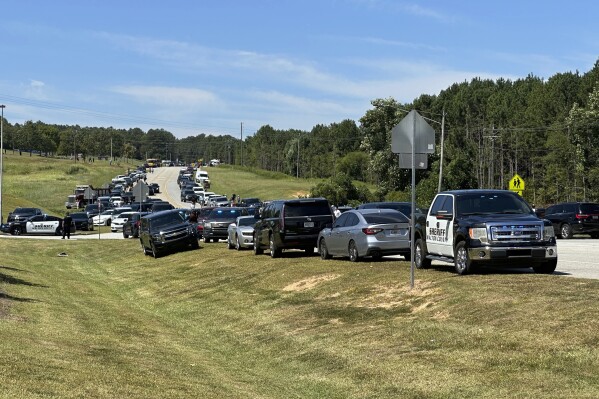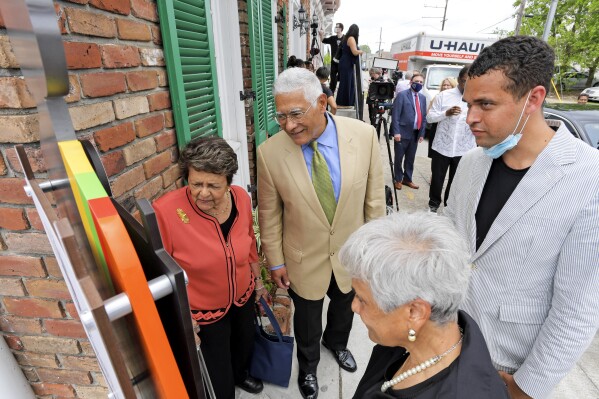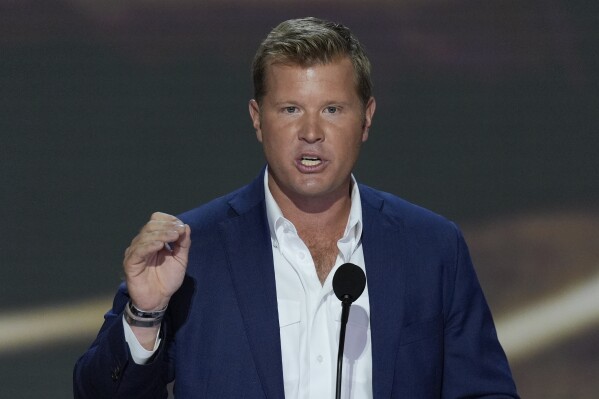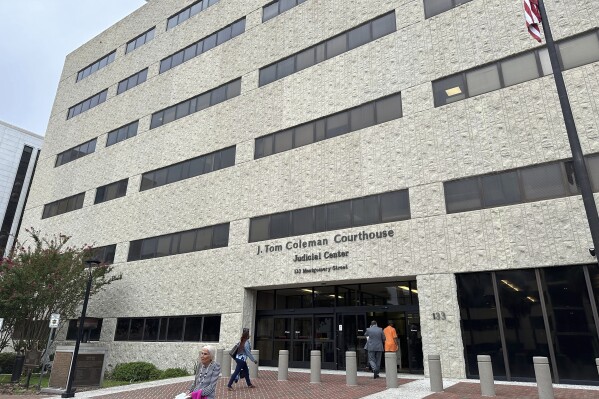The first minister of Scotland has vowed his government's goal is to "lift every child who is in poverty out of it".
John Swinney set out his legislative plans for the next 12 months in his maiden Programme for Government.
As well as tackling child poverty, he also revealed actions to address the climate emergency, grow the economy, and pledged to overhaul the rules which govern the conduct of ministers.
Mr Swinney's speech to the Scottish parliament came just 24 hours after Finance Secretary Shona Robison announced a £500m package of spending cuts to support the government's 2024/25 budget.
The latest figures show that 26% of children are living in relative poverty in Scotland, despite targets to reduce that number to less than 18% by the end of the current financial year and 10% in 2030/31.
Mr Swinney said: "No child should have their opportunities, their development, their health and wellbeing, and their future curtailed by the material wealth of their family. Not ever, and certainly not today in a modern, prosperous society like Scotland.
"This is not only the moral compass of my government, it is the greatest investment in our country's future that we can possibly make."
The first minister said around £3bn a year has been dedicated to eradicating poverty and mitigating the impacts of the cost of living crisis.
'System of whole-family support'
Mr Swinney highlighted the introduction of the Scottish Child Payment in 2021 - which helps low-income families with children under 16 - as an example of the Scottish government's efforts to combat the issue.
He also cited figures from the Child Poverty Action Group (CPAG), which has estimated that low-income families in Scotland will be £28,000 better off by the time their child turns 18, compared to others across the UK.
Mr Swinney said: "Analysis by the Scottish government estimates that around 100,000 children will be kept out of relative poverty this year.
"These achievements are significant and show the difference that we are making. But our goal is not just to keep some children out of poverty, or only to make child poverty less acute.
"Our goal is to lift every child in Scotland who is in poverty out of it. So, we must do more."
The first minister pledged a "system of whole-family support", including:
• A focused approach to help support more parents into employment
• Ensuring women get to know and receive care and support from the same midwifery team from pregnancy through to birth
• £1bn a year in affordable, high-quality and funded early learning and childcare.
• A commitment to support early development and reduce developmental concerns at 27-30 months by a quarter by 2030
• Support schools to reduce the poverty-related attainment gap across every local authority each year between now and 2026
• Investment in community-based youth work and career support
• The expansion of advice in accessible settings, including community centres and hospitals
• The national rollout of the Carer Support Payment, which will support more than 100,000 carers this financial year.
A safe speech from the SNP hoping to avoid further political drama
 Connor Gillies
Connor Gillies
Scotland correspondent
@ConnorGilliesThis was supposed to be John Swinney's moment to shine. His moment to reset the SNP record after a catastrophic general election result – the worst outcome for the nationalists in more than a decade.
Today he played it safe. It felt like a far cry from the energy witnessed in similar moments at the height of the SNP's success.
The first minister tried to strike an optimistic tone despite one of his ministers confirming half-a-billion pounds of cuts less than a day ago.
The Edinburgh administration fending off claims of financial incompetence for a costly council tax freeze that is arguably coming home to roost.
Given the scale of the money worries facing Scottish ministers, there was a danger this plan for the year ahead would be overshadowed.
Mr Swinney spent a considerable amount of time weaving his noble mission to eradicate child poverty through his speech, but the question is whether it will make a difference.
Critics of the SNP have said there has been a sense for a long time that the party has overpromised and underdelivered.
This statement felt guarded and a step away from some of the more controversial policies of the past that arguably ended Nicola Sturgeon and Humza Yousaf's time in the top job.
There were no cheers from the government benches at a flashy new vote-winning policy and very little mention of independence as the first minister is aware voters rejected his plans for a second vote when they went to the polls in July.
The question is whether this programme for the next year will do enough to sweep away the SNP critics who claim they are a tired party who, after almost two decades in power, are out of ideas.
Sources within Mr Swinney's circle tell me they just want to get to the 2026 Holyrood election without further scandals, police investigations and political drama.
Keep up with all the latest news from the UK and around the world by following Sky News
Tap hereHousing and environment a key theme in Swinney's speech
The first minister pledged to invest nearly £600m in affordable housing this year, including an additional £40m to bring existing homes into affordable use.
A further £100m will be provided to support the construction of around 2,800 mid-market rent homes.
Proposals for rent controls are also continuing through parliament.
Two green freeports will be developed and two new investment zones will be established.
And with a commitment of up to £500m investment, the Scottish government will seek to generate at least £1.5bn in private investment to support the offshore wind sector.
Mr Swinney said specialist support for disabled people will be enhanced across all local authorities by next summer.
NHS boards will receive an increase to their baseline funding to reduce waiting list backlogs and work will continue to tackle delayed discharge.
Councils will be provided with £145m to protect teacher numbers.
A review of Creative Scotland is to be undertaken, but funding will be provided to allow it to restart its open fund.
Read more from Sky News:
Black hole 'likely larger than £22bn'
Cutting winter fuel payments 'will stabilise the economy'
Speaking about the twin crises of climate change and biodiversity loss, Mr Swinney said: "Ten of our hottest years have come in the last 20, and the increased frequency of storms and floods is already having a real impact on communities and key sectors."
A Natural Environment Bill will be brought forward and climate change legislation that will enable five-year carbon budgets to be set and delivered will be introduced.
The Scottish government hopes to secure a positive future for Grangemouth, and will also invest £9m to support energy efficiency and decarbonisation projects.
Mr Swinney said the government was within reach of 6,000 electric vehicle charging network points in 2024, two years ahead of schedule.
He has pledged to set a clear timetable for the delivery of around 24,000 more by 2030.
👉 Tap here to follow Politics at Jack and Sam's wherever you get your podcasts 👈
Opposition criticise statement as 'list of empty platitudes'
The government later responded to claims by the Scottish Greens that it appeared to have dropped a commitment to expand universal free school meals to P6 and P7 pupils.
A spokesperson said: "The Scottish government continues to be committed to the universal expansion of free school meals in primary schools.
"We are already delivering this provision in primaries one to five, with the next stage of the rollout being for primary six and seven pupils in receipt of the Scottish Child Payment.
"However, the current financial situation means that universality will now not be delivered by 2026.
"The Scottish government will work with partners in local government to meet our joint ambition to fully deliver on this commitment.
"Should funding from the UK government become available, then we will endeavour to complete delivery for all of Scotland's primary pupils."
Meanwhile, the Scottish Conservatives slammed the statement as "a list of empty platitudes by an SNP government that is out of ideas and out of money".
Party leader Douglas Ross added: "It's appalling that despite presiding over a drugs and alcohol deaths crisis, the SNP leader didn't even mention this national emergency, let alone outline a plan to tackle it.
"The proposal to beef up the ministerial code - one of precious few concrete proposals from this clapped-out SNP government - is welcome and overdue. But it's also an admission by John Swinney that he shamefully mishandled the Michael Matheson scandal."
Disclaimer: The copyright of this article belongs to the original author. Reposting this article is solely for the purpose of information dissemination and does not constitute any investment advice. If there is any infringement, please contact us immediately. We will make corrections or deletions as necessary. Thank you.



